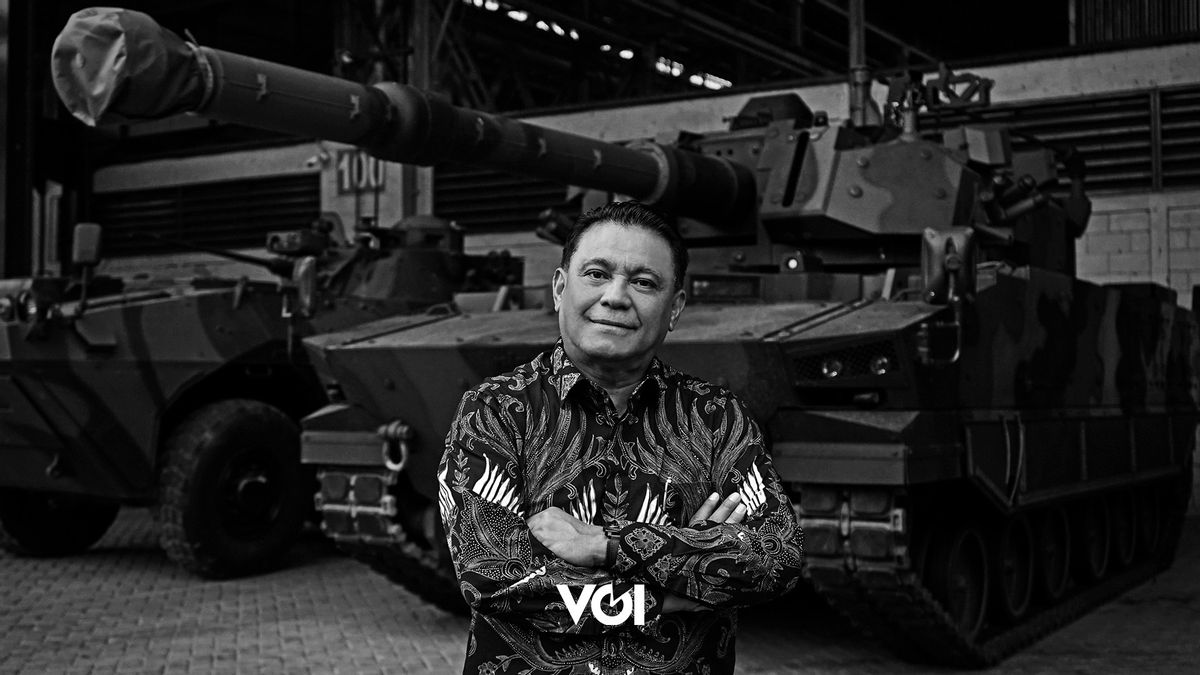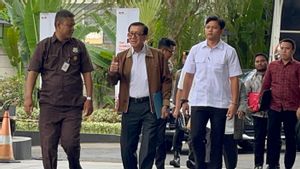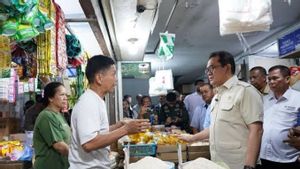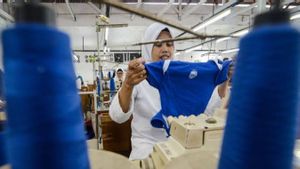Not only military products are produced by PT Pindad, non-military products can also be produced. According to the Managing Director of PT Pindad Dr. Ir. Abraham Mose, MM., this can be done because the human resources and technology that his company has makes it possible. However, the company's core business remains unchanged, as a producer of military products and those related to defense and security in the current digital era.
***
As a company founded in 1808, PT Pindad has gone through a long history. This state-owned company has produced various types of weapons ranging from long-barreled weapons, handheld weapons, pistols, combat vehicles and others. As it got older, Pindad's business line also developed. Now agricultural equipment, heavy equipment, special vehicles, transportation infrastructure, mining services, cyber security have also been carried out. Apart from that, there are several subsidiaries engaged in engineering, medical, trade and logistics.
Producing non-military equipment is one of the tips for increasing company revenue. "Now we also produce non-military equipment, why do we produce this because the human resources and equipment are relatively the same. So we produce agricultural equipment, heavy equipment such as excavators, there are also spare parts for trains and gas cylinders. We also have a subsidiary, called Pindad Engineering and there is also a hospital; under the auspices of Pindad Medika Utama," explained Abraham Mose.
Even though it has expanded by producing non-military equipment, according to him, the core of Pindad's business has not changed. The percentage of products produced has changed slightly, previously it was 80% military products and 20% non-military products, and now it is 70:30.
Apart from producing itself, Pindad is grouped in the Defense Industry BUMN Holding, Defense Industry Indonesia (DEFEND ID), together with PT Len Industri (Persero) as the parent of DEFEND ID, and PT Dirgantara Indonesia (formerly IPTN), PT PAL Indonesia, and PT Dahana , also carried out co-production.
Meanwhile, the matter of rejuvenation and maintenance of TNI defense equipment is also the task of PT Pindad. “In the TNI environment there is defense equipment maintenance. All equipment produced by Pindad is handled by one division which is tasked with carrying out maintenance and up-grading of existing defense equipment. Such as combat vehicles, weapons and so on. It is our obligation to do so," he said to Iqbal Irsyad, Edy Suherli, Bambang Eros and Irfan Medianto from VOI who met him at the PT Pindad Head Office in Bandung, not long ago. Here's the excerpt.

The public knows PT Pindad as a manufacturer of weapons and military equipment, but not only that, what does it produce?
Indeed, people are more familiar with PT Pindad, which is a manufacturer of military equipment such as weapons, bullets, tanks, combat vehicles (Ranpur) and so on. For weapons, we have SS1, then there is SS2 with various variants. Then there was a pistol with the code P1, and now P3, MAG4 and Armor with various variants. We produce small, medium and large caliber ammunition.
For armored vehicles, we produce the Anoa, Komodo, Badak which are equipped with a 90mm cannon, Harimau with a 105mm cannon, Pandur with a 30 mm cannon and a 12.7 mm gun. There are also rantis and ranop which we named Maung versions 1, 2 and the latest version 3 which we tried earlier.
For non-military anything?
We also produce non-military equipment, why do we produce this because the human resources and equipment are relatively the same. So we produce agricultural equipment, heavy equipment such as excavators, there are also infrastructure for trains, and we also make gas cylinders. All of this is a unity of military and non-military products that both contribute to PT Pindad. We also have a subsidiary, called Pindad Engineering and there is also a hospital; under the auspices of Pindad Medika Utama.
Where are these Pindad products exported to?
There have been many requests from various parties to have Pindad products. Some have been realized, some are still in process. We now export quite a lot of ammunition to America. Apart from that, we also export to Asian and Southeast Asian countries and Europe. Indeed, the volume is not much, but this is an achievement for us. That our products are recognized and used by other countries.
Our Ranpur Anoa and Komodo products have also been used in UN peacekeeping missions in Congo, Central Africa and Lebanon and Sudan. So Pindad products are already well known abroad. In the future we must improve the quality and introduce our products more
How does Pindad face competition in producing combat equipment?
Actually, if we talk about the superiority of military products, it depends on the country that uses them. For example, in Indonesia, of course the products we produce are truly in accordance with operations here. Meanwhile in the desert we produce Anoa version 3, for snowy areas we also adapt it. As for shooting ability, it depends on the weapon produced.
It could be that our product, for example Tiger, is superior for use in the Middle East, while products from other countries are superior in certain countries. So in the military industry we look at the advantages of each country that produces certain equipment. The competition is more about the innovation produced.

Why are non-military products not widely known and used, is it because they are not promoted enough or are there other reasons?
We haven't been producing agricultural equipment and excavators for a long time. However, for the supporting infrastructure at the Ministry of Transportation and our ships, we were already involved. Our products are immediately noticed by users. Like the excavator, we have produced 700 units. The users are the PUPR Ministry, mining companies and other agencies.
We are currently opening a branch that can distribute our products so they reach the market more quickly. Regarding desires, I really want our products to be used throughout Indonesia. This is our homework so that the product is more widely spread. We see agricultural equipment and production from China, for example, which is very widely distributed and the prices are also cheap. In order to get there, we need working capital and time so that our products are liked by the public. The government's TKDN (Domestic Content Level) policy provides opportunities for us to enter a number of Ministries. For the commercial market, we also collaborate with several parties so that our products can also be spread. This is what we do to make our non-military products more widely used. The potential is huge, it would be a shame if we backed out.
What is the ratio of military and non-military products produced by Pindad?
Previously the ratio was 80% military products and 20% non-military products. Later it reduced to 70:30. However, our core business is in military products, to increase revenue from non-military products is the answer.
Indonesia has collaborated with Korea in making a sophisticated fighter aircraft (KAI KF-21 Boramae), is Pindad involved?
Not directly for that project, but in weapons we have been working with Korea for quite a long time. With LG-NextOne we work together to create communication tools. Then with Poongsan we worked together to make ammunition. We also cooperate with Korea in weapons production. So our relationship with Korea has been around for a long time and is still continuing.
Turkey is currently one of the reliable producers of weapons and war equipment, their drone production is in great demand, is PT Pindad also able to compete in the production of drones and other advanced combat equipment technology?
Talk of cooperation with Turkey has been going on since 7 or 8 years ago in making medium tanks. Then we tried to make a medium tank that was lighter than the main battle tank but had better maneuverability. We use Canon 105 mm. This is the result of the development of both countries, because each invested. One was made in Indonesia and the other was made in Turkey, then tested and the results were upgraded and the result was a medium tank that was used by our cavalry troops.
We thank the Ministry of Defense for providing Pindad with the opportunity to collaborate with technology vendor countries, thereby producing superior products. So we have implemented the strategic partnership pattern.
Apart from Korea and Türkiye, which other countries have collaborated with Pindad?
We have collaborated with Australia, Belgium and America. We have plans to open an ammunition production division in America to be closer to consumers there.
Indonesia has PTDI and PT PAL Indonesia, is there cooperation in producing aircraft and ships, either for civil or military purposes?
Yes, we have entered the defense industry cluster; DEFEND ID. We have a joint program, when we make fighter aircraft, for example the controller is from PT Len Industri, the weapons are from PT Pindad and the aircraft itself is from PTDI. Likewise for ship production, there is collaboration between PT Len Industri which will be responsible for radio and communications, PT Pindad which supplies weapons and ammunition, and of course the ship body from PT PAL Indonesia.
What collaboration products have been produced?
We have work with PT PAL Indonesia, for non-military there are ship cranes, turning tables. There are also weapons placed on PT PAL production ships. For ships from the KKP, we have also installed heavy weapons there to chase fish thieves in our seas. There is also cooperation with Basarnas.
Regarding cyber security, it is now a concern for many parties, at what stage can PT Pindad provide cyber services when someone needs them?
Like it or not, nowadays the concept of conventional war has changed to asymmetric war, there is cyber propaganda. To deal with this situation, we have a special division for cyber security. Whatever it is, start with detection, identification and prevention. We also provide tools that we built ourselves to carry out these three steps; detection, identification and prevention. Not only that, we also provide services for cyber security.
Regarding the rejuvenation of defense equipment in the TNI, to what extent is Pindad prepared to handle it, what can be done and what cannot be done?
In the TNI environment there is defense equipment maintenance. All equipment produced by Pindad is handled by one division to carry out maintenance and up-grading of existing defense equipment. Such as combat vehicles, weapons and so on. It is our obligation to carry out rejuvenation and maintenance. If you don't feel sorry for our TNI, the items that have been handed over cannot be used if they are not maintained and rejuvenated in time. Including combat vehicles produced by Pindad which are operated by UN peacekeeping forces. We and the TNI went there to carry out maintenance where the armory was placed.
What can't Pindad do?
For electronic control, we still ask for personnel from abroad. Especially for weapons that use software from other countries, like it or not, we have to consult with them in the maintenance and rejuvenation process. Likewise with the production machines in our factory, we still have to consult with experts from other countries that produce the machines.
What other future programs will Pindad undertake, both short and long term?
Change is inevitable, we have to adapt so as not to be crushed. We must carry out research and development so that we can continue to survive amidst increasingly rapid technological advances. We will apply robotic and drone technology in the future. In production, the ranpur will be made lighter so that it can be carried by helicopter, for example. To enter modern warfare, our cyber division also continues to develop so that it can enter the concept of modern warfare.
Currently artificial intelligence (AI) technology has been widely applied in various sectors, has Pindad also adopted this concept?
Not all AI concepts have been implemented yet. Several of our production units already use robotic technology to pursue quality and quantity. But the impact is that we reduce contract employees. This is actually a dilemma. Hopefully this Pindad will continue to exist and develop amidst this very rapid technological progress.
Abraham Mose and the Philosophy of Fish

Not only is he a hobby of keeping ornamental fish, it turns out that the Managing Director of PT Pindad, Dr. Ir. Abraham Mose, MM., can learn from fish philosophy. He applied this to himself personally and also to his team at the company. “When we first raise fish, it will keep moving. Likewise with us when we enter a new environment. "We have to be able to adapt to the environment," said the man born in Gorontalo, July 27 1961.
Over time the fish will recognize who their master is. "The fish will recognize who often gives it food, they will be comfortable and calm when they meet me," added Mose, who was sad when his Arowana fish died because it jumped out of the aquarium.
"Likewise with the work environment, when we are comfortable we will feel calm. But remember, don't stay in your comfort zone for too long. Must immediately move to a new place. Fish, if you want them to grow, you have to have a new, wider pond. "Employees are also like that, if someone is too mature in one area, they have to be rotated so they can develop further with new challenges," said Mose, who has several Arowana collections both in the office and at home.
Exercise Discipline

Outside of his busy life as a professional, Abraham Mose likes exercising. What he does is take a morning walk, cycle and occasionally play golf with colleagues and friends. “Every day I exercise, usually walking in the morning. Every day I go for at least an hour in the morning around the house. If it rains, I do it on the treadmill at home," said Mose, who completed a Bachelor's degree in Electrical Engineering at Hasanudin University, Makassar.
Mose admitted that starting a sport was not easy. However, what is more difficult is maintaining consistent exercise, because you have to have commitment and discipline. “Making exercise a habit is not an easy thing. But once it becomes a habit, it feels like something is missing if you don't exercise. So it has to be done, whatever the situation," said the man who is continuing his Masters in Management and Doctoral program studies at Padjadjaran University, Bandung.
In order to consistently exercise, you have to fight against laziness. "Once we lose the fight against laziness, it will be difficult to do sports again," added Mose, who replaced Silmy Karim as number one person at PT Pindad.
Not only does he exercise, he also maintains his food intake. “I started reducing my carbohydrate intake, so I limited my portions of rice. But it's really difficult, especially if you're eating with friends. Sometimes I'm tempted to add more, hehehe," he said with a small laugh.
Mose really used the momentum of fasting during Ramadan to train himself. "Fasting is extraordinary, I am motivated to maintain my diet," said Mose, who really enjoys eating instant noodles.
Motivation for Achievement

Even though he is busy with activities at the office, Mose still shares his attention with his children and wife. “After my duties at the office, I get used to eating with my family at home. At the dinner table we can chat casually and discuss," said Mose during weekend activities with his family.
Mose, who was raised by a father who was a police officer, received a harsh upbringing. “I was educated with strict discipline by my father. Everything is very orderly, at certain times you have to wake up, eat, go to school and sleep. This discipline was instilled from childhood until I grew up," recalled the man who once served as President Director of PT Len Industri.
Another thing his father taught him was to respect parents and admit mistakes. “Once there was a person driving a vehicle fast. I spontaneously shouted, but it turns out he was my father's boss. I was told to apologize for what I had done. The moral message is to respect parents and admit mistakes," Mose smiled, remembering that moment.
To employees at Pindad he provided motivation to achieve. “Don't just be satisfied with working and getting a salary. You must have self-motivation to excel and be the best," he said. "In the work environment we cannot walk alone, we have to socialize, work in a team so that corporate goals can be achieved," concluded Abraham Mose.
"Not all of the AI concept has been implemented. Some of our production units have used robotic technology to pursue quality and quantity. But the impact is that we have reduced contract employees by around 50%. This is actually a dilemma. Hopefully this Pindad will continue to exist and develop amidst technological advances that this is so fast,"
The English, Chinese, Japanese, Arabic, and French versions are automatically generated by the AI. So there may still be inaccuracies in translating, please always see Indonesian as our main language. (system supported by DigitalSiber.id)












